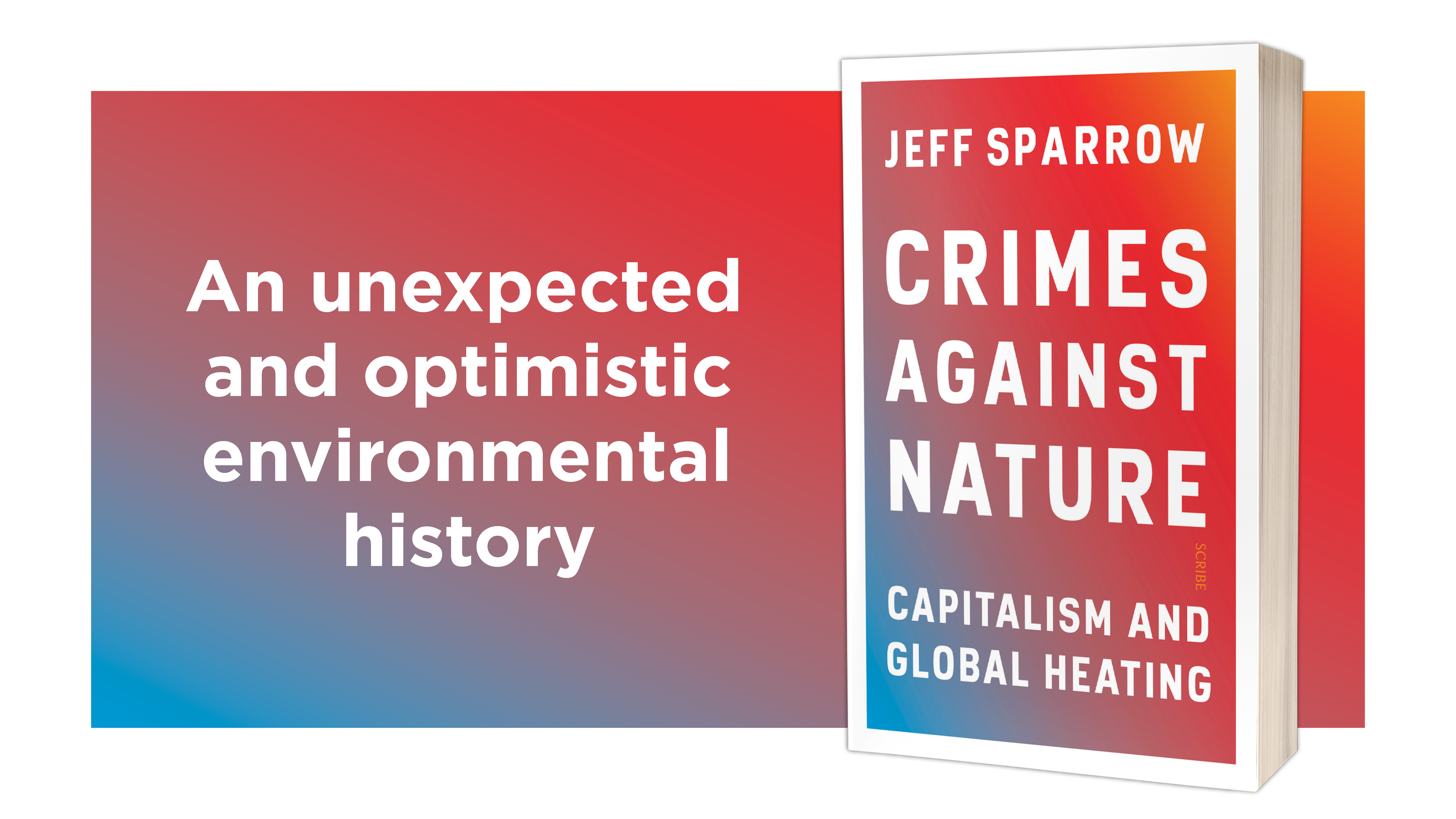Related content

AUTHOR
Jeff Sparrow
Jeff Sparrow is a writer, editor, broadcaster, and Walkley…
Discover
In Crimes Against Nature Walkley award-winning journalist Jeff Sparrow takes the familiar narrative about global warming — the one in which we are all to blame — and inverts it, to show how, again and again, pollution and ecological devastation have been imposed on the population without our consent and (often) against our will.
Jeff argues in his important polemic that ordinary people have consistently opposed the destruction of nature and so provide an untapped constituency for climate action.
Read Jeff’s introduction below.
In a famous passage, the labour organiser and folk singer Utah Phillips identified our whole planet as a crime scene.
‘The earth is not dying,’ he explained, ‘it is being killed, and those who are killing it have names and addresses.’1
He’s right. But it’s not at all what we’re usually told.
It’s more common to hear that global heating stems from innate human greed, a vice for which we are all responsible.
We buy the wrong things, we eat the wrong food, and we don’t separate our trash. Our collective rapacity drives the deforestation, the pollution, and, of course, the emissions of greenhouse gases, as industry groans and strains to keep us all satisfied.
That’s the customary accusation, the ‘common sense’ narrative of climate change. It’s a frame-up, a calumny levelled to help the real culprits evade justice. In reality, from the very first adoption of fossil fuels to the ineffectual negotiations on emission levels, climate change has been driven not by the many but by the few. A tiny coterie has used every weapon at its disposal to cajole, coerce, or persuade the rest of us to accept practices we never wanted and that we often resisted. Whether we recycled or rode bicycles or turned off our lamps never made any difference to them.
According to the most recent Oxfam report, the twenty-six richest billionaires own as many assets as the 3.8 billion people comprising the poorest half of the planet’s population.2 Yet, despite the staggering inequalities of the current Gilded Age, we’re still presented with narratives that flatten all responsibility for the crisis. In these stories, we’re all guilty, with global heating and the environmental crisis more generally almost the inevitable consequence of human progress, as if homo sapiens were a kind of virulent disease.
To repeat, it’s not true.
There’s another history — a true history — that doesn’t defame ordinary people, one in which the villain isn’t humanity per se so much as a particular set of social and political structures that didn’t exist in the past and needn’t exist in the future.
This book presents a dozen interconnected essays offering a polemical indictment of capitalism’s role in the climate emergency. It begins with a case study, showing how American car culture developed, not from a popular love for gas guzzlers, but as the result of a systematic corporate assault on sustainable alternatives. From there, it discusses the nature of nature, and shows how the destructive practices of our everyday life were forced upon us, often with tremendous violence. It tracks the campaigns deployed to normalise the war on nature, and explains how they will continue even as the planet’s ecosystems decline and collapse. After a detour through a history of the Soviet Union and the environment movement itself, it argues that a better world remains possible, if we believe in our own ability to create it.
Climate researchers work in geological ages, studying vast periods over which they track changing conditions through sediments, dust, fossils, and other unimaginably ancient traces.
Yet they also tell us that time’s running out — that, if we don’t act at once, we risk broaching planetary limits and sending the world, via spiralling feedback loops, into a state from which it may never fully recover.
In other words, you’re living through some of the most significant years in human history, with the decisions made in a desperately brief span weighing on the planet forever.
That awesome responsibility makes the attribution of liability for what’s happened so far tremendously important.
At the very moment we need collective heroism and unparalleled determination, we’re told that we’re criminally worthless: mindless consumers obsessed only with material satisfaction, too lazy and stupid even to recycle, selfishly reproducing without thought to the ecological impact of our children, and almost genetically predisposed to selfishness and avarice.
Such accusations are paralysing.
The environmental crisis demands massive change. Part of that change pertains to how we think about guilt and responsibility.
You don’t have to be the villain in this story. You could, in fact, be the hero — or, at least, one of them.
Let’s see how.
A polemic about global warming and the environmental crisis, which argues that ordinary people have consistently opposed the destruction of nature and so provide an untapped constituency for climate action.
Crimes Against Nature uses fresh material to offer a very different take on the most important issue of our times. It takes the familiar narrative about global warming — the one in which we are all to blame — and inverts it, to show how, again and again, pollution and ecological devastation have been imposed on the population without our consent and (often) against our will. From histories of…

Jeff Sparrow
Jeff Sparrow is a writer, editor, broadcaster, and Walkley…
Discover